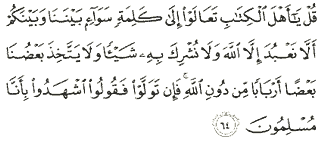Common Ground, Medical Research, Paradigm Shift
Issue 605 » October 29, 2010 - Dhul-Qida 21, 1431
Living The Quran
Common Ground
Al-Imran (House of Imran) Chapter 3: Verse 64
 "Say (to them, O Messenger): 'O People of the Book, come to a word common between us and you, that we worship none but God, and associate none as partner with Him, and that none of us take others for Lords, apart from God.' If they (still) turn away, then say: 'Bear witness that we are Muslims (submitted to Him exclusively.)'"
"Say (to them, O Messenger): 'O People of the Book, come to a word common between us and you, that we worship none but God, and associate none as partner with Him, and that none of us take others for Lords, apart from God.' If they (still) turn away, then say: 'Bear witness that we are Muslims (submitted to Him exclusively.)'"
This call made by Islam 14 centuries ago to the People of the Book, is still being made to the People of the Book and people of learning today; it is of great significance, especially from the following viewpoint:
1. In conveying Islam to others we should seek a common point on which to meet the audience. If it is worshipping One God without associating any partners with Him in relation to People of the Book, then when dealing with atheists it can be sharing the same human nature and destiny on the earth.
2. Using an attractive, gentle style, and endearment are of great importance. If we can liken Islam to a magnificent palace that has as many roads to reach it as there are in the whole of creation and as many portals to enter it as there are human beings, then there is a door for each human being to enter it and what we must do is to be able to detect to whom we must show which door.
3. The verse has shown how various consciences, nations, religions, and books can unite in one essential conscience and word of truth, and how Islam has instructed the human realm in such a wide, open, and true path of salvation and law of freedom. It has been shown fully that this is not limited to Arab or non-Arab people. Religious progress is possible not by narrow consciences or by being separate from one another, but by being universal and broad.
4. Worshipping God without associating any partners with Him in His Divinity is the primary condition of believing in One God and following His religion.
Compiled From:
"The Quran: Annotated Interpretation in Modern English" - Ali Unal, pp. 139-140
"Kur'an'dan Idrake Yansryanlar" - Fethullah Gulen, pp. 109-110
"Hak Dini Kur'an Dili" - Elmahh Hamdi Yazir, Vol 2. pp. 1131-1132
Understanding The Prophet's Life
Medical Research
As related by Bukhari, God's Messenger (peace be upon him) declared: "God did not send down an illness for which He did not send a cure." This hadith, in addition to declaring that every illness is curable, is the most comprehensive statement encouraging medical research. In another Tradition, the Messenger states that "there is a cure for every illness." [Abu Dawud, Muslim]
Another version tells us: "Do not neglect to treat your diseases, for God does not send a disease for which He does not send a cure. The only exception is old age." [Tirmidhi, Ibn Majah]
Humanity may discover a cure for every illness, but will never be able to stop our journey from the world of spirits to the material world and then on to either Paradise or Hell through the stations of embryo, infancy, childhood, youth, old age, the grave, and the Resurrection. The Prophet encourages us to learn how to cure illnesses, but also warns us not to neglect preparing for the next world.
Compiled From:
"The Messenger of God: Muhammad" - Fethullah Gulen, pp. 62
Cool Concepts
Paradigm Shift
When a person truly and consciously believes in the articles of Islamic faith, he becomes a Mumin (believer) and his paradigm is expected to shift at that very instant from a non-Islamic one to the holistic Islamic perspective, even though turning one's ship of life may take prolonged time and effort.
When the paradigm shift takes place, the Mumin becomes a Muslim (one who has submitted according to the demands of faith.) Every Muslim adopts Islamic paradigms according to his or her own level of commitment and clarity of understanding Islamic perspectives. The adoption of Islamic paradigms is termed in the Quran as a believer's soul being imbued in Allah's dye or hue, "Sibghatullah" - the Islamic baptism of a person's spirit.
The minimum acceptable standard of adopting Sibghatullah is called Taqwa. It is characterized by an ongoing consciousness and frequent remembrance of Allah, restraint in fulfilling one's desires, caution in conducting one's affairs and care in fulfilling one's obligations to Allah so that His displeasure and/or punishment are successfully avoided. Only people who shift their paradigms to the level of Taqwa can claim to be true Muslims and only they can benefit from the guidance of Islam.
The ideal, most desired level of Sibghatullah is called Ihsan. Ihsan is characterized by passionate love for Allah with corresponding fervent remembrance of Him and consciousness of being in His presence day and night, paying minimum attention to physical needs in order to maximize attention on seeking Allah's pleasure, doing more than commanded, giving more than required, joining those who want to separate, being generous to those who deprive them, forgiving those who abuse them, pursuing excellence in dealing with people and aiming for the highest level of Jannah and closeness to Allah.
Compiled From:
"Islam: Adopting Its Paradigms" - Ayub A. Hamid, pp. 129-130